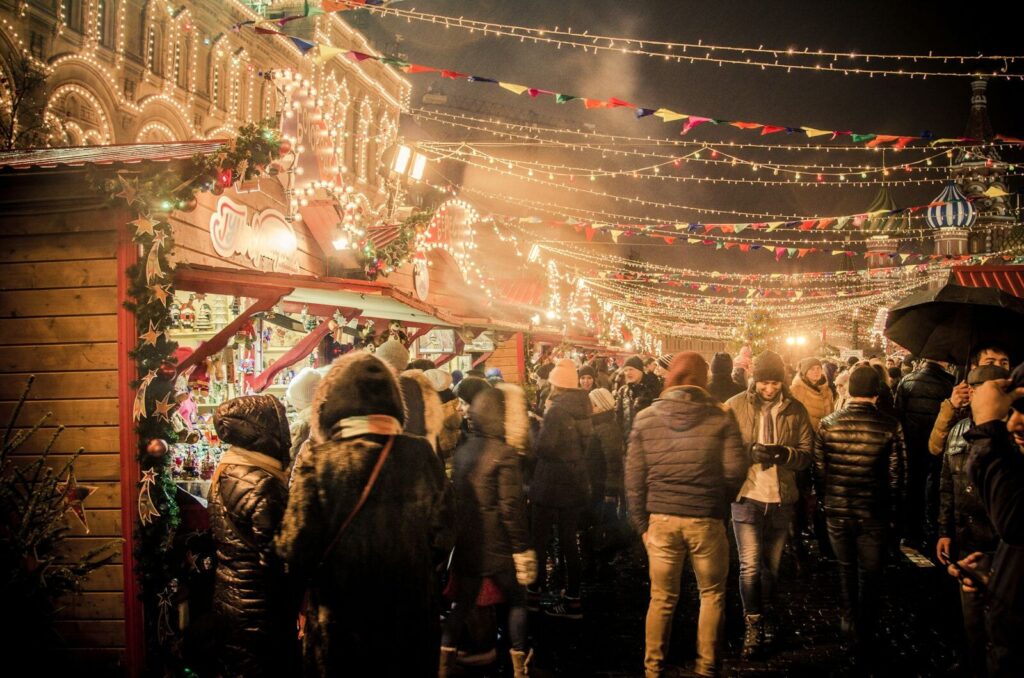Christmas is a Christian holiday celebrated in many countries around the world, commemorating the birth of Jesus Christ, which, according to tradition, took place on December 25th.
Although it was originally a religious event, its evolution over the years has been significant.
This celebration has its own traditions in each country, and even in each home. However, there are common elements such as decorations, gift exchanges, or dinners and gatherings with family and friends.
Today we want to tell you how Christmas is celebrated in different countries, or how it is known in other parts of the world.

Let’s first talk about its origin. These dates are associated with ancient pagan festivals like the Roman Saturnalia and the winter solstice, celebrations that were adopted and transformed by the Christian Church. Even though the New Testament does not specify the exact date of Jesus’ birth, December 25th was adopted in the 4th century during the papacy of Pope Julius I to coincide with existing pagan festivals and facilitate conversion to Christianity.
Before this date was adopted, many cultures celebrated important events such as:
- Saturnalia (Rome): The Romans honored the god Saturn with festivals that coincided with the winter solstice. These celebrations included banquets, gifts, and an atmosphere of festivity and joy.
- Sol Invictus (Rome): Also in Rome, December 25th marked the day of the “Invincible Sun,” celebrating the rebirth of the sun and the lengthening of days after winter.
- Yule (Scandinavia): In Germanic and Nordic cultures, this festival honored the winter solstice and the return of the sun. Some customs included the use of wooden logs and feasts, which directly influenced modern Christmas traditions.

HOW IS CHRISTMAS CELEBRATED IN DIFFERENT COUNTRIES?
In Europe, Christmas is one of the most important holidays of the year, and many of its traditions originated there.
- Spain: Celebrations begin with Christmas Eve (December 24th) with a family dinner and continue with Midnight Mass. The Day of the Kings (January 6th) is as important as Christmas, when children receive gifts from the Three Wise Men.
- Germany: Advent is fundamental, and on December 6th, Saint Nicholas is celebrated, leaving small gifts. Christmas markets are popular, and traditional foods like gingerbread and mulled wine are enjoyed.
- United Kingdom: Homes are decorated with Christmas trees, and turkey is traditionally eaten on December 25th. It’s also common to exchange “Christmas crackers” and watch the Queen’s (or King’s) speech.
- Scandinavia: In countries like Sweden and Norway, Saint Lucia (December 13th) is an important tradition, with candlelit processions. Christmas includes hearty meals like ham and sweets.
In the United States and Canada, Christmas is a highly commercial and family-centered celebration.
- United States: Homes are decorated with lights and Christmas trees, and Santa Claus brings gifts to children on the morning of December 25th. Gift exchanges, family dinners with turkey or ham, and watching Christmas movies are common.
- Canada: Similar to the United States, but with more French traditions in the Quebec region, where “Réveillon,” a large dinner after Midnight Mass, is celebrated.
In Latin America, it is a very important religious celebration, characterized by its religious traditions and typical foods.
- Mexico: The Christmas season begins with “posadas,” which reenact the journey of Mary and Joseph. On Christmas Eve, there is a large family dinner, and in some places, fireworks are set off.
- Colombia: “Day of the Little Candles” is celebrated on December 7th, lighting up the streets. The “novena” is a religious tradition of prayers in the days leading up to Christmas.
- Argentina and Brazil: Since Christmas falls in the summer, celebrations include outdoor dinners and cold dishes. Christmas Eve is celebrated with fireworks, and Santa Claus brings the gifts.
Christmas traditions in Africa vary greatly depending on the religion and the country, but it is generally a more community-focused celebration.
- South Africa: Christmas falls in summer, so many families celebrate with barbecues (braai) and outdoor activities. Homes are decorated with trees and Christmas lights, and Santa Claus brings gifts.
- Ethiopia and Egypt: For Orthodox Christians, Christmas is celebrated on January 7th. The holiday is closely tied to religious ceremonies such as Mass and fasting. Christmas is known as ‘Genna or Leddet.’
In many Asian countries where Christianity is not the main religion, Christmas is celebrated more commercially or culturally.
- Japan: Though not a Christian country, Christmas is a very commercial holiday. People exchange gifts, and it’s common to eat strawberry cake and fried chicken (especially from KFC). Christmas is more of a romantic celebration for couples.
- Philippines: This is the country with the largest Catholic population in Asia, and Christmas celebrations are very long, beginning in September and extending until January. “Simbang Gabi” (midnight masses) are an important tradition.
In Oceania, Christmas is also celebrated in the summer, which influences the customs.
- Australia: Given the warm climate, many people celebrate with barbecues at the beach or outdoors. Santa Claus is popular but often depicted in summer clothes. Large sporting events are also part of the season.
- New Zealand: Similar to Australia but with Maori traditions in some communities. New Zealanders also celebrate with dinners and barbecues, and the pohutukawa tree, which blooms at Christmas, is a local symbol of the holiday.
In Antarctica, although there is no native population, scientists and workers in the research stations typically organize small Christmas parties with decorations, gift exchanges, and dinners, although it’s a more private and modest celebration due to the extreme conditions.

Each continent brings its own customs and variations to Christmas celebrations, reflecting cultural richness and local traditions.
If you travel to any of these destinations, you will be able to see how this holiday is celebrated in different parts of the world.




